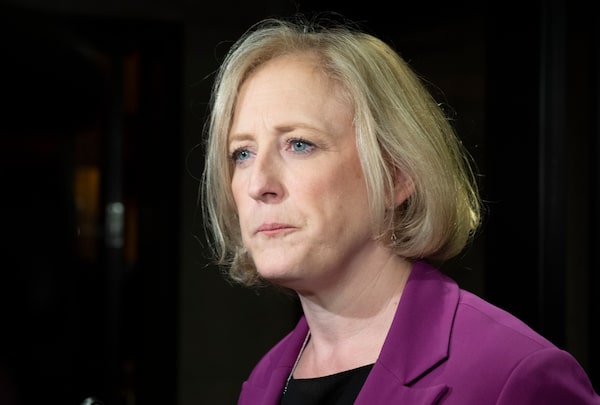
Former Conservative MP Lisa Raitt, who is co-organizing the race, said the rules for the race remain a work in progress, but the committee setting them continues to meet frequently.Adrian Wyld/The Canadian Press
Federal Conservatives will gather in Toronto on June 27 to pick their next leader.
A decision to set the date for the vote was made Friday, the latest development in the effort to replace current leader Andrew Scheer, who announced in December he would resign upon the election of his replacement.
Former Conservative MP Lisa Raitt – who challenged Scheer for the leadership in 2017 – was appointed soon after last month’s announcement to be the co-chair of the committee charged with setting the rules of the contest.
“The committee is meeting frequently to make sure we do this in the most open, efficient and transparent way to make sure we get a good result,” she said Friday.
The remaining rules, including the potential entry fee and the number of names required on nomination forms to enter, have yet to be set.
The decision to hold the vote in June is likely to receive mixed results from party supporters, some of whom wanted a vote sooner in order to set the party in good standing to defeat the Liberal minority government.
But elements of the contest – including the requirement for a mail-in ballot – are enshrined in the party’s constitution, making a speedier race challenging to organize.
Others hoped for a longer lead-in, which would allow those new to the party or the process time to mount a credible campaign.
There are a number of people already organizing for a run. They include Erin O’Toole, a current MP and former leadership contender, who held meetings over the holidays to put together a team, current MP and former cabinet minister Pierre Poilievre, as well as local businessman Bryan Brulotte, who has lengthy ties to the party.
Former Quebec premier Jean Charest, former interim party leader Rona Ambrose and former cabinet minister Peter MacKay are also all considering a bid.
The June 27 vote will be only the third time the Conservative membership has elected a leader. The first was Stephen Harper, elected three months after the Conservative party was formed by the merger of the Canadian Alliance and Progressive Conservatives in 2003.
Ambrose was elected as interim leader by Conservative MPs and senators following Harper’s resignation upon losing government in 2015.
Scheer was elected by the membership in May 2017, following a 16-month contest. He announced he was quitting in mid-December, saying he could no longer give the job his all.
His decision came amidst mounting criticism of his leadership, the party’s failure to form government in the October election and questions about his use of party funds to cover his personal costs.
Our Morning Update and Evening Update newsletters are written by Globe editors, giving you a concise summary of the day’s most important headlines. Sign up today.